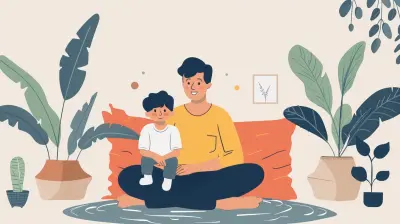Practical Tips for Comforting a Child Afraid of Doctors
22 October 2025
Let’s be real—few things are more nerve-wracking than attempting to soothe a panicked toddler who thinks the doctor’s stethoscope is an alien tentacle. If you've ever wrestled a child into a car seat while promising the doctor probably won't give them a shot, you're not alone. Fear of doctors is super common among kids, and it can turn a routine checkup into a full-blown episode of toddler drama theatre.
But don’t worry—parenting doesn’t come with a manual, but this might just be the next best thing. Grab a snack (and maybe a juice box for yourself), because we’re about to dive into practical, playful, and yes, sanity-saving tips for comforting a child afraid of doctors.
Why Are Kids So Afraid of Doctors?
Before we fix the problem, let’s figure out what we’re dealing with. Kids don’t wake up one day and decide white lab coats are terrifying. Their fear usually comes from:- Fear of pain (needles, anyone?).
- Fear of the unknown (what is that weird ear-spoon thing, anyway?).
- Past negative experiences.
- Stranger anxiety (that awkward person in the lab coat? Total stranger).
- Overheard conversations ("The last time he got a shot, he SCREAMED for hours!").
Understanding the “why” helps you respond with empathy, not just bribery (although bribery will definitely make an appearance later on).
1. Talk About It Beforehand (But Keep It Chill)
Honesty Is Key – Sugarcoating Is Not
If your kid’s appointment is coming up, give them a heads up. Avoid springing it on them like a surprise party you know they'll hate. But don’t go overboard and turn it into an anxiety-fest either. The goal? Inform, don’t alarm.Try this:
> “We’re going to the doctor next week so she can check how awesome your body’s growing! It might tickle, and she might need to give you a little poke, but I’ll be with you the whole time.”
That’s it. No dramatic music, no horror movie trailer voice. Just calm, simple news.
2. Play Pretend: The Doctor Will See You Now (In Your Living Room)
Rehearse Like It’s Broadway, Baby
Bust out the toy doctor kit and become Dr. Stuffins, complete with dazzling bedside manner. Let your child take turns being the doctor and the patient. Don't be surprised if their teddy bear suddenly needs ten band-aids and a triple lollipop prescription.Why it works? Role-playing takes the scary out of the unknown. Bonus: it’s hilarious and lets you spot their misunderstandings—like thinking a stethoscope sucks your soul out.
3. Validate Their Feelings (Even the Bonkers Ones)
Say It, Don’t Downplay It
Kids need to feel heard. If your child says, “I'm scared of the doctor!” the worst response is “There's nothing to be scared of.” To them, the fear is real, and brushing it off makes them feel alone in it.Try instead:
> “It’s okay to be scared. Lots of kids feel that way. I’ll be with you the whole time.”
Boom. Instant reassurance.
Think of yourself as the emotional GPS for your little road-tripper. They're behind the wheel of their anxiety-mobile; your job is to gently guide them toward Calm Town.
4. Pack a “Doctor Visit Survival Kit”
Snacks, Toys, and Emergency Stickers
Let’s be honest: a well-packed bag can make or break your child’s mood faster than you can say “waiting room meltdown.” Here's what to bring:- Their favorite toy or stuffed animal (preferably one that’s been to “medical school” during playtime).
- Snacks – because even fear takes a coffee break.
- A new book or activity they haven’t seen a hundred times.
- A comfort object – blankie, pacifier, your old hoodie—anything that smells like home.
- Stickers or small surprises as rewards (a.k.a. bribes, sweet glorious bribes).
5. Stay Calm (Even If You’re Dreading the Shot Too)
Channel Your Inner Zen Parent
You may be simmering inside (especially if your child screamed the last time they so much as saw a cotton ball), but kids are like tiny emotional thermometers. They pick up on your stress quicker than a dog detects bacon.Take deep breaths. Speak slowly. Smile even if it hurts. You’re basically auditioning for the role of “Zen Master” in the waiting room sitcom.
6. Don’t Surprise Them with Shots – But Don't Make Them the Villain Either
Honesty Over Ambush, Always
Shots might happen. You know it. They might suspect it. Don’t lie. But also, don’t make the shot the evil villain in this healthcare saga.Try saying:
> “Sometimes the doctor gives a shot to help keep you from getting really sick. It might pinch, but it's super fast. And we’ll do something fun right after.”
Then suggest something like:
> “Let’s count to three together before, and you can hold Bunny really tight.”
Let them be part of the plan. Suddenly, they have some control. And control, my friends, is power when you’re small and scared.
7. Celebrate Every Win – Even the Tiniest Ones
High-Fives and Stickers Galore
Did your child walk into the clinic without crying? Win. Did they only scream once? Double win.Celebrate progress, not perfection. Whether it’s a post-doctor trip to the park, a treat from the treasure box, or just an over-the-top verbal celebration, let them know they did something big. Because for them, it was.
8. Schedule Strategically – Timing Is Everything
Pick the Goldilocks Time Slot
You wouldn't book your root canal for 2 a.m., right? So don’t schedule your child’s doctor appointment for nap time, hangry o’clock, or five minutes after you tell them they can’t have a third cookie.Choose a time when they’re usually at their best—after a snack, post-nap, and with plenty of time to get there without rushing. It’s not bulletproof, but it’s a much smoother ride.
9. Use Technology to Your Advantage
Video Visits and Story Apps
If your child is especially anxious, consider scheduling a telehealth appointment first, just to meet the doctor virtually. That way, they can associate the doctor’s face with less scary stuff—like talking about favorite colors or pretending to examine a plush giraffe.You can also find kids’ apps and storybooks focused on doctor visits. Reading them together takes the sting out of the unknown and gives your child language to express their worries.
10. Make the Doctor a “Friend” Before They’re a “Doctor”
Arrange a Pre-Visit If Possible
Okay, not every pediatrician has time to hang out over juice boxes, but some offices offer orientation visits for nervous kids. Call ahead to see if your child can come in to say hello, peek into a room, and maybe even get a free sticker.The idea is to build trust without pressure. No pokes. No blood pressure cuffs. Just a friendly face in a now-familiar place.
11. Use Humor—Because Laughter Is the Best (Non-Prescription) Medicine
Silly Voices, Funny Faces, and Weird Comparisons
Does your kid freak at the word “thermometer”? Try turning it into a tongue tickler.> “Open wide for the lollipop spaceship!”
Is the blood pressure cuff the enemy? Turn it into a robot arm hug.
The more you laugh about it, the less power it has over them. Humor is sneaky like that—it seeps into fear’s fortress and breaks down walls without anyone noticing.
12. Teach Breathing Techniques Like a Little Yogi
Breathe In the Courage, Blow Out the Fear
Okay, meditation might sound like a big ask, but even tiny humans can learn simple breathing tricks. Here's one:- Smell the flower (inhale)
- Blow out the candle (exhale)
Repeat a few times with them before and during the appointment. It works better than you’d think, and it gives them something to do instead of scream.
13. Don’t Be Afraid to Switch Doctors If Things Aren’t Working
Find the Right Fit
If your kid always leaves sobbing and you leave questioning your life choices, it might not be your child—it might be the doc. Some pediatricians are wizards at putting kids at ease. Others... not so much.Don’t be afraid to find one who’s a better match for your family’s vibe. A warm, funny, patient doctor can make all the difference.
Final Thoughts: Patience, Love, and Possibly Ice Cream
Raising kids means loving them through even their strangest fears—whether it's monsters under the bed or ear thermometers. Comforting a child afraid of doctors takes patience, creativity, and a bit of acting talent. But with prep, play, and a whole lot of love, you’ll turn that once-dreaded checkup into something your child might not exactly look forward to—but won’t run screaming from, either.And hey, if all goes well, maybe next time you can promise only one lollipop and mean it.
all images in this post were generated using AI tools
Category:
Dealing With FearsAuthor:

Steven McLain
Discussion
rate this article
1 comments
Imani Cross
This article offers valuable strategies for alleviating children's fears of doctors, but it could further explore the emotional aspects of fear. Acknowledging and validating a child’s feelings can enhance their coping mechanisms, fostering resilience beyond medical settings.
October 23, 2025 at 3:00 AM

Steven McLain
Thank you for your insightful comment! I appreciate your suggestion to delve deeper into the emotional aspects of fear; acknowledging and validating a child's feelings is indeed crucial for their resilience. I'll consider this for future discussions.


